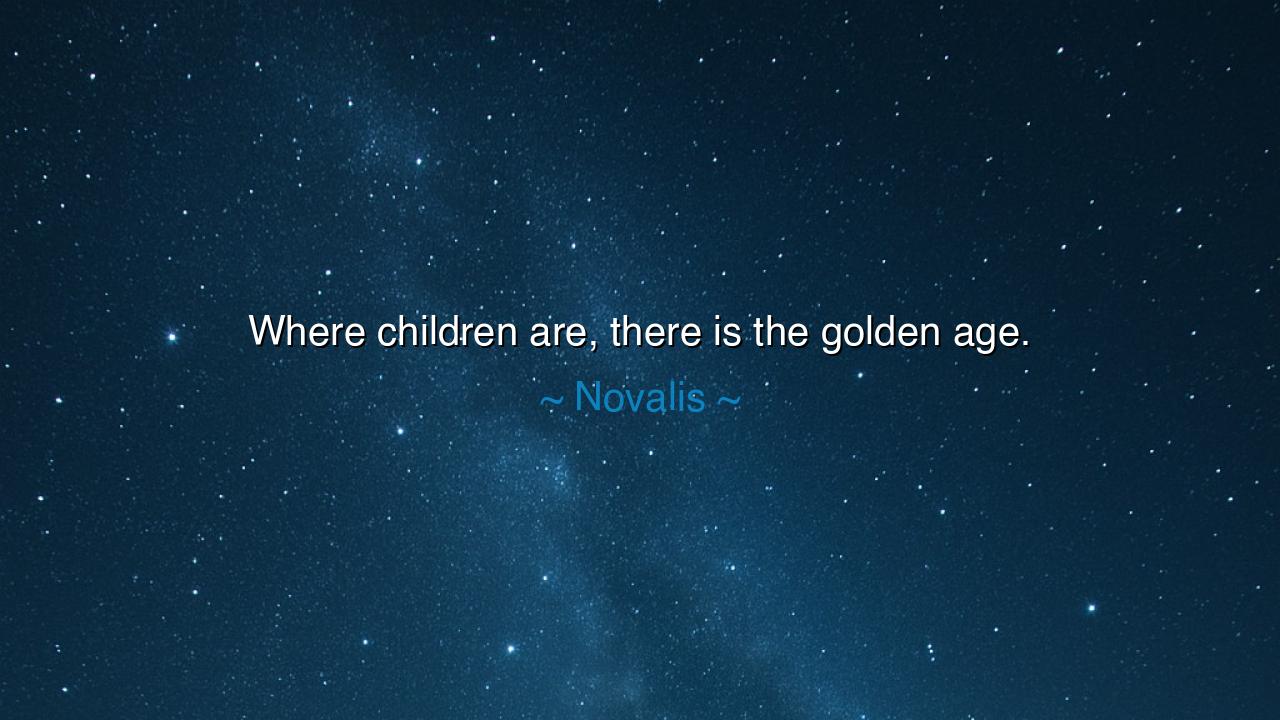
Where children are, there is the golden age.






"Where children are, there is the golden age." — thus spoke Novalis, the German mystic and poet of the Romantic dawn, whose words shimmer like sunlight breaking through mist. To him, the presence of a child was not merely a sign of youth, but a glimpse into eternity — the golden age that humanity forever seeks but seldom finds. His wisdom reminds us that the paradise once lost is not gone from the world; it lives still in the laughter, wonder, and purity of the young. For wherever children dwell, innocence returns, and the heart remembers its divine origin.
In the style of the ancients, one might say: in the eyes of a child, time forgets its burden, and the soul remembers its beginning. Novalis, born Friedrich von Hardenberg in the late eighteenth century, lived at a time when reason had risen to rule the world. Yet he, with the vision of a seer, looked beyond intellect and progress, longing for the return of beauty, faith, and awe. In this quote, he spoke not only of children as beings of youth, but as symbols of purity, imagination, and hope — qualities that, when present, make even the darkest age golden. The child, in his vision, is a living bridge between the divine and the human — untouched by cynicism, untainted by greed. Where such spirits dwell, the world itself seems reborn.
To understand this, we must remember what the golden age has always meant. In every tradition — Greek, Roman, Hindu, or Christian — it is the time of harmony, when man walked with the gods, when peace reigned and the heart knew no fear. Novalis teaches us that this mythical age is not behind us, nor ahead of us, but within our grasp, renewed with every birth. For the child carries within their laughter the echo of creation’s first joy. To be near them is to feel again that the world is not ruined but radiant, not lost but alive.
Consider the story of Helen Keller, who, though born into silence and darkness, found her way to light through the guidance of her teacher, Anne Sullivan. When the young Helen first learned that every object had a name — when water poured over her hands and she understood the word “water” — a new world was born within her. That moment was a golden age, not only for Helen but for all who witnessed it, a testament to the unbroken purity of the child’s soul. In her awakening, the world itself seemed renewed. Such is the power of the childlike spirit: to make even the impossible bloom into wonder.
Novalis’s words are not merely sentimental — they are prophetic. He reminds us that the measure of a civilization lies in how it treats its children, for they are the living proof of its morality, imagination, and love. Where children are cherished, creativity flourishes; where they are silenced or forgotten, the world grows cold and old. Thus, the golden age is not an era of wealth or invention, but of tenderness and vision — a time when humanity protects the flame of innocence rather than extinguishes it.
The lesson is clear: to live well, we must learn from the child. Let us guard their laughter, for it is the music of a better world. Let us look upon the world with their wonder, for it renews what age has made weary. To bring about a new golden age is not to build monuments of stone, but to nurture the hearts of the young — to teach them kindness, to feed their curiosity, to preserve their dreams. And in doing so, we, too, recover our lost divinity, remembering that we were once children ourselves.
And so, my child, heed the wisdom of Novalis: the golden age is not a time, but a presence. Wherever the eyes of the young shine with trust and joy, there the world is made whole again. Protect that light, in them and in yourself. Let no bitterness dim it, no cynicism quench it. For the secret of immortality lies not in defying time, but in remaining childlike before the mystery of existence. Where there are children — where wonder still breathes — there, indeed, is the golden age.






AAdministratorAdministrator
Welcome, honored guests. Please leave a comment, we will respond soon